Half of College Biology Students in the United States Think Evolution is Atheistic
by Liz Barnes

Does someone have to be an atheist to accept evolution? According to the philosophy of science and many science educators the answer is no. However, my recent study has revealed that over half of college biology students in the United States think that in order to accept evolution fully, they would have to be an atheist. This is a challenge if we want to increase acceptance of evolution in a country were almost half of the residents do not think humans evolved.
We asked students in college biology classes to describe ideas that one would have to reject in order to accept evolution and half of students wrote that believing in God and/or religion was off the table if they were going to accept evolution. Both religious and non-religious students were equally likely to hold this misperception, but it was only among highly religious students that we saw a relationship between an atheistic perception of evolution and their acceptance of evolution. Among non-religious students it did not matter for their acceptance of evolution whether they perceived evolution as atheistic, but highly religious students who perceived evolution as atheistic had the lowest levels of evolution acceptance and the highest levels of perceived conflict between their religion and evolution. So, having this misperception that evolution is atheistic seems to be impacting upon these students’ acceptance of evolution, but why do these students think evolution is atheistic?
Blame is often placed on students’ religious communities where anti-evolution sentiments are common but as a biology education researcher, I encourage evolution instructors to reflect on their own role in propagating the misconception that evolution is atheistic. While the majority of college students in the US are religious, the majority of college professors teaching evolution are not. Further, whether these students believe what they are being taught about evolution – particularly human evolution – will largely depend on whether they think evolution conflicts with their religious beliefs. Given that a large percentage of their instructors teaching evolution are atheists – it is not surprising that students would think that evolution itself is atheistic. However, evolution instructors should be careful not to impose their own religious beliefs (or in this case, lack of religious beliefs) onto the scientific theory of evolution, which is most accurately described as agnostic and not atheistic. Regardless of whether an instructor holds religious beliefs themselves, I encourage them to explicitly address the perceived conflict between religion and evolution and to emphasize areas in which evolution and religion do not have to be in conflict. Below are some concrete steps for helping decrease perceived conflict between religion and evolution and addressing the misconception that evolution is atheistic.
Teach the Bounded Nature of Science
The bounded nature of science is the assertion that science only has the means to answer questions about the natural world using natural explanations and cannot address questions regarding supernatural phenomenon. Whether someone understands and accepts the bounded nature of science might determine whether he or she considers evolution to be atheistic or agnostic. The term “agnostic” was coined by Thomas Henry Huxley (who was a strong advocate of evolution when Darwin published the Origin of Species) to describe what he believed was the most scientific view of nonscientific matters. Huxley wrote:
Agnosticism is of the essence of science … It simply means that [we] shall not say [we] know or believe that which [we] have no scientific grounds for professing to know or believe … Consequently, agnosticism puts aside not only the greater part of popular theology, but also the greater part of anti-theology … Agnosticism simply says that we know nothing of what may be beyond phenomena.
Thomas Henry Huxley, 1884
I advocate that the term “agnostic” is a useful characterization of evolutionary theory, because it is most aligned with the bounded nature of science, and it is fitting that this term is already associated with evolution in the history of science. Teaching students about the bounded nature of science can help change their perceptions of evolution as atheist to agnostic.
Discuss religious scientists that accept evolution
Theodosius Dobzhansky famously said in a 1973 essay that “Nothing in Biology Makes Sense Except in the Light of Evolution” but what people do not usually realize is that he also argued for compatibility between religion and evolution in that very same essay. Dobzhansky was a pioneer of the modern evolutionary synthesis of evolution and genetics and was also religious. Francis Collins is director of the National Institutes of Health (NIH) in the United States and headed the human genome project. A staunch defender of the importance of evolution, he is also an evangelical Christian and he founded the organization BioLogos to promote harmony between evolution and religion. Kenneth Miller is a Catholic biologist who famously argued against the teaching of intelligent design in science classes during the Kitzmiller vs Dover trial and wrote a book on the compatibility between his faith and evolution. Discussing these scientists can highlight where evolution and religion can be compatible and give students an opportunity to see their own religious identity reflected among authoritative scientists.
Discuss theistic evolution
Theistic evolution is the belief that a supernatural deity is somehow responsible for evolution. A person can fully accept every tenant of evolution, including the common ancestry of life on earth and still think this was somehow the work of a supernatural creator. Highlight theistic evolution as a concrete way that someone can believe in God/god(s) and accept evolution. If you do not believe in God/god(s) resist the urge to project your own beliefs onto evolution. Evolution is by definition agnostic rather than atheistic, and therefore both an atheistic and theistic view can be compatible with the scientific theory of evolution (read more here).
Conclusion
In studies done with my team we are consistently finding one clear theme: the perception of conflict between religion and science is greater than the reality of conflict (see this study for one example). We should work to mitigate this misperception if we want the public’s perception of evolutionary biology to improve.

Liz Barnes is Assistant Professor of Biology Education at Middle Tennesse State University. You can read her Researcher Profile here.
